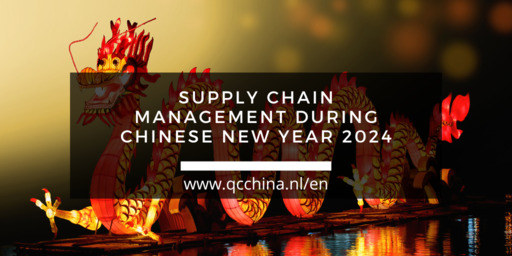
Supply chain management during Chinese New Year 2024
Supply chain management during Chinese New Year 2024
The Chinese New Year in 2024 will pose challenges for Western importers and entrepreneurs. However, with careful planning and preparation, these challenges can be overcome. The Spring Festival is a time of great joy and celebration in China, and it is important to respect and appreciate this cultural tradition.
It is worth noting that during this time, there is a mass return of factory workers to their homes, resulting in a 15-day production halt in China. This is a significant period of family gatherings and holidays for approximately 400 million people in China.
Factories often close during the Chinese New Year, which falls between January 21 and February 21. This can result in significant downtime in the supply chain and potential transportation issues, which may affect the supply of products to Western importers.
Supply chain management for importers
It is crucial for importers to proactively manage their supply chain during this period to mitigate risks to product quality and ensure timely delivery. To mitigate the risks of delays in order processing and a decrease in product quality due to staff shortages and inefficient production processes, it is essential for importers to take precautions.
- Begin planning early: A good starting point is to begin planning early by forecasting inventory and production needs to minimize the impact of factory closures during the Chinese New Year. To mitigate potential disruptions in the supply chain, explore alternative suppliers or distribution channels.
- Minimize problems with staff: It is crucial to minimize staff problems during this period, as the lack of personnel can lead to a loss of quality.
- Be prepared for longer delivery times: Factories may need to recruit new workers and spend time training them, which can result in production taking weeks to return to full capacity.
- Continuous monitoring of product quality: To ensure product quality, implement additional inspections can help determine the quality of products. Be assured that we are taking necessary measures to ensure timely delivery of your orders.
More information?
For further assistance in managing your supply chain during the Chinese New Year, please feel free to contact us. QC China specializes in providing support to Western companies in optimizing their supply chain, both within and outside Europe.
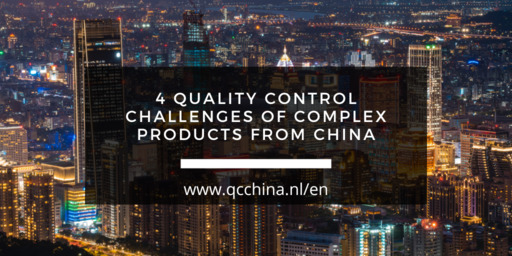
4 Quality Control Challenges of Complex Products from China
4 Quality Control Challenges of Complex Products from China
For Western companies that import goods from China, attractive deals can sometimes lead to unexpected problems. In addition, some start-ups may overlook the importance of careful verification of their product quality. This article discusses four major challenges that importers of complex products from China may face.
Challenge 1: Complexity of Product Design
Complex products often have intricate designs with numerous parts and functions. This makes quality control during production more challenging. In order to manage this complexity, importers need to establish detailed specifications and control points at an early stage in the process.
Ensure that you and your suppliers have a clear understanding of product specifications. In addition, a quality control checklist helps identify design flaws and ensure the accuracy of all components.
Key Points:
- Define detailed specifications and checklists for product designs.
- Ensure suppliers have a clear understanding of established design requirements.
- Create a quality control checklist to promptly identify design flaws.
Challenge 2: Materials and Components
Complex products typically comprise diverse materials and components, elevating the risk of defects and making production control challenging. To ensure material and component quality, importers must conduct regular quality checks and establish strict standards and specifications.
Performing During Production Checks can help detect various defects early in production, maintaining the quality of materials and components.
Key Points:
- Regularly conduct quality checks to verify material and component quality.
- Establish strict standards and specifications for materials and components.
- Use During Production Checks to identify and rectify defects during production.
Challenge 3: Managing Multiple Suppliers
It can be challenging to manage multiple suppliers for complex products. Different suppliers provide different materials and parts. This increases the risk of defects and complicates control measures.
To ensure product quality, conducting a factory audit at each supplier before the actual production process is crucial. This ensures both the quality and reliability of suppliers you aim to collaborate with.
Additionally, this control measure prevents unreliable collaborations in manufacturing countries like China, Vietnam, India, Bangladesh, Pakistan, Turkey, or elsewhere in Europe.
Key Points:
- Conduct a factory audit at each supplier before the production process.
- Manage the risk of unreliable collaborations and assess suppliers based on performance and quality.
Challenge 4: Lack of Product Knowledge Among Suppliers
Quality control for complex products becomes challenging when manufacturers lack clear knowledge about a product’s function and requirements. Some products commonly used in the Western world may be completely unknown in other countries due to cultural differences.
If the factory workers who make your product have never seen or used such a product, it will be difficult to troubleshoot problems and ensure proper manufacturing.
For this reason, you should maintain open and clear communication with your suppliers. When in doubt, ensure proper execution of quality control processes by having an on-site quality inspector.
Key points:
- Assess a manufacturer’s competence beforehand.
- Establish open and clear communication with your suppliers.
- Consider sending technical experts to production locations.
Need more information?
For Western importers, addressing these challenges seriously and taking the necessary steps to ensure product quality is crucial. For more information on conducting quality controls in China or other manufacturing countries, feel free to contact us anytime.
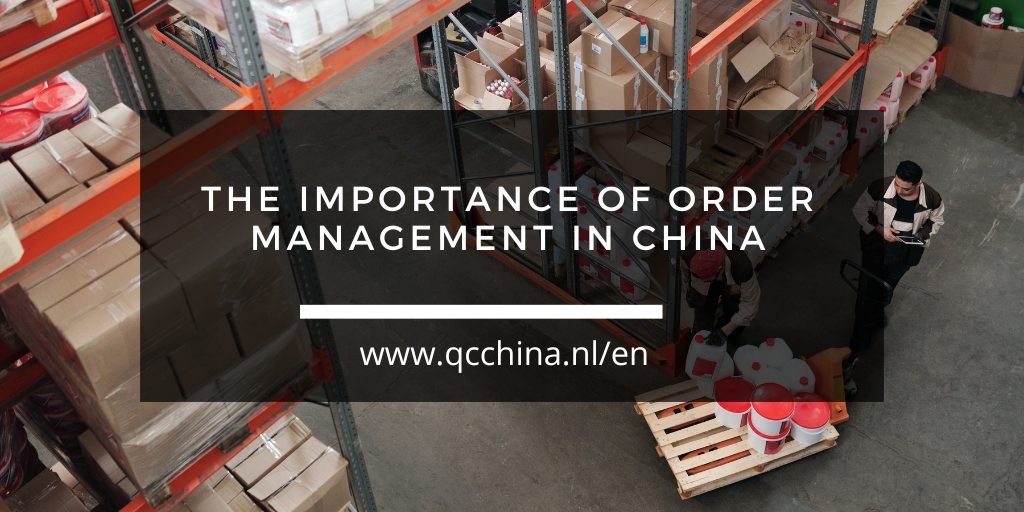
The Importance of Order Management in China

The Importance of Order Management in China
Managing the production line and product delivery from China can be quite challenging. In this blog post, you’ll learn more about the importance of order management in China for Western companies and entrepreneurs.
What is Order Management?
Order management is the process by which a company collects, processes, and delivers customer orders. It covers the entire process from placing an order to delivery of the product to the customer. This includes managing business processes such as:
- Inventory
- Production
- Transportation
- Delivery
- Invoicing
Managing these processes ensures that orders are delivered on time and within the specified requirements. For importers who want to do successful business in a country like China, this forms an essential part of their supply chain management.
Why is Order management important when outsourcing production to China?
For Western companies and entrepreneurs, it’s crucial to maintain control over the production process and the delivery of products from China. This can be achieved through order management. Below are some benefits of order management when outsourcing the production process to China:
Timely delivery: Order management ensures timely product delivery. This allows customers to receive their products on time and keeps the production line running smoothly.
Cost savings: Order management ensures that products are produced and delivered at the lowest possible cost. This enables companies to save costs and strengthen their position compared to competitors.
Quality control: Effective order management ensures that products are manufactured according to specified standards and quality norms. Quality checks like First Article Inspections provide importers with more certainty about the quality of their product and whether they meet customer expectations.
Communication: Order management facilitates seamless communication between Western companies and their suppliers in China. This can help solve any supply chain issues and avoid unnecessary delays.
How Can Order Management Be Improved?
Order management is crucial when outsourcing production to China. It ensures timely product delivery, cost savings, quality inspections, and smooth communication.
Western importers can enhance their order management performance by partnering with an experienced and reliable partner. Quality Control supports companies and entrepreneurs in optimizing their production lines with various inspections and improving communication between importers and Chinese suppliers.
More information?
If you want to know more about the importance of order management in countries like China, Vietnam, India, Pakistan, Bangladesh, the Philippines, Turkey, and Europe, feel free to contact us.
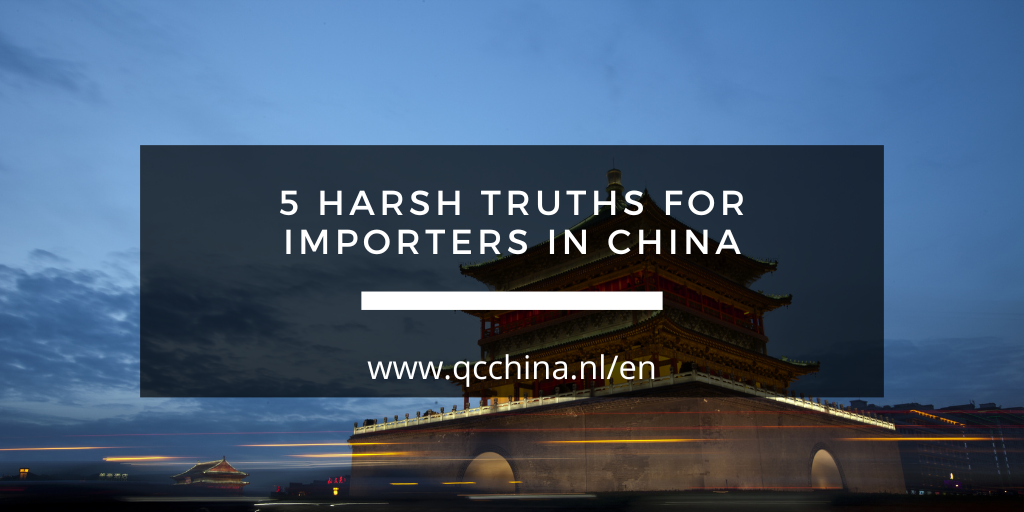
5 Harsh Truths for Importers in China
5 Harsh Truths for Importers in China
For Western companies and importers, it’s easy to fall into the trap of seemingly great deals offered by Chinese trading companies. Many new entrepreneurs fail to take sufficient precautions with their initial orders, leading to a lack of control over the quality of their production line. In this article, you will find 5 harsh truths for importers in China that they will inevitably encounter sooner or later.
1. Too Small for a Large Manufacturer
Some independent entrepreneurs assume that they can turn to a large factory in China for every order. Unfortunately, this is not always the case. Large factories often have multiple clients simultaneously, which means that small orders may not receive priority.
Therefore, it’s wise for small-scale businesses to conduct a Factory Audit in advance. This helps importers choose the right supplier, avoiding unreliable collaborations in China.
2. Unclear Communication
Importing products from China requires extensive preparation and work. Ensure that you are precise in communicating product specifications and have them signed by the supplier.
If specifications are unclear or missing, the manufacturer will often make assumptions. To prevent this, using a quality control checklist can be an excellent solution. Additionally, always have the product quality checked by an independent inspector.
3. No Return Policy in China
Ensure that the product quality is inspected before the goods are loaded into the shipping container. It’s also important to supervise the loading process. With a Container Loading Check (CLC), importers can monitor the loading process.
Once the goods are en route, it becomes challenging to address quality issues. It’s crucial to prevent this, as it can save unnecessary costs and protect your company’s reputation.
4. Promises Should Be Kept
A successful China importer will never make excessive promises to potential customers without verifying if their products meet the correct specifications. Giving a distorted image of product quality often comes at a high cost for entrepreneurs.
If the quality falls short and products are still sold, it won’t take long for the first complaints to flood in through customer service. This can have serious consequences for both profit and reputation.
5. Minimizing Risks
Importing products from China can help a starting entrepreneur grow their business. However, it generally poses a significant challenge for novice importers who may rush to make quick profits.
This haste often leads to skipping important steps in the procurement process, jeopardizing the quality guarantee of products from China. By working with reliable suppliers, collecting important documents, and conducting regular quality inspections, you can minimize most risks and maintain profitable imports.
Want to Learn More?
Are you starting a new business or seeking more assurance about the quality of Chinese import products? Feel free to contact Quality Control. We conduct quality inspections on behalf of companies and importers in countries such as China, Vietnam, India, Bangladesh, Pakistan, Turkey, and across Europe.

Internship at Quality Control China: Growth and Development

Internship at Quality Control China: Growth and Development
HBO Informatics students Michelle and Wendy from Avans University of Applied Sciences in Den Bosch have been successfully engaged in their graduation internship at Quality Control for three months now. In a recent interview, they shared their experiences and discussed their growth and development during their time at the company.
Michelle, who is specializing in business informatics, was looking for a graduation internship at a company that could enhance her knowledge and skills in making business processes more efficient. She said, “Quality Control appealed to me because of their international focus and the opportunity to learn more about Chinese culture.”
Wendy, a final-year HBO Informatics student, was also looking for a company that not only aligned with her interests, but could also stimulate her personal and professional development. “The company is involved in procurement from China, which piqued my interest due to my Chinese background. Additionally, the task about process optimization appealed to me.”
Together, they have been given the opportunity to work on a task that fits their interests. “The team at Quality Control, including my supervisor Ties Coolen, has been very helpful and involved throughout the entire process, which has contributed to a pleasant and inspiring internship experience,” Michelle added.
Despite the challenges that the current situation brings, both students have been given the opportunity to learn and develop their skills. Wendy shared, “Ties Coolen has not only dedicated himself to guiding our task, but also to our personal development. He has helped us improve our communication skills and taught us how to work effectively as a team.”
Michelle appreciates the international focus of the company, and Wendy values the interaction with her Chinese colleagues. “Through the personal experiences of the entire team, I have been able to learn a lot about Chinese culture and economy, and how they influence the rest of the world. It’s inspiring to work for a company that is committed to educating young professionals,” Michelle said.
Wendy also emphasized, “A valuable addition to my internship experience was the contact with my Chinese colleagues in Chinese. This has helped me improve my language proficiency and gain more insight into Chinese culture.”
Upon completion of their internship, Michelle and Wendy hope to apply their acquired knowledge and skills in their future careers. Both would certainly recommend Quality Control to other students looking for a valuable internship experience. They agree that it’s a great opportunity to work on interesting projects, to learn about a different culture and economy, and to promote personal and professional growth.
“After my internship, I hope to work as a consultant and apply my acquired knowledge and skills to other companies,” Michelle said. Wendy added, “I am grateful for the knowledge and experience I am gaining during my internship, and I plan to use this to continue my future career in informatics.”
Both students believe that their time at Quality Control has prepared them for their future careers and strongly recommend the company to other students. “It’s a great opportunity to work on interesting projects and to learn from a company that is committed to educating young professionals,” they concluded.
Want to know more?
Discover the valuable internship of students Wendy and Michelle at Quality Control. This internship offers both personal development and benefits for the internship company. Feel free to contact us for more information or if you have any questions about internships. Quality Control China, India, Vietnam and Turkey is ready to assist you!

What is dropshipping and how does it work?
What is dropshipping and how does it work?
What is drop-shipping and how does it work? Drop-shipping is a popular way to sell products without having to buy and store them first. Instead, you only purchase the products after they have been sold and ordered by the customer.
This means you don’t have to invest a large amount of money in inventory and can start selling quickly and easily. In this article, you will find more information about how drop-shipping works exactly and what the advantages and disadvantages are.
What is drop-shipping?
Drop-shipping is a popular way to sell products without purchasing them in advance. The importer or selling party works with a manufacturer who ships the products directly to the customer.
This means the selling party does not have to worry about storing, shipping, or packaging products. They generally only focus on selling products and act as the point of contact for customers.
How does dropshipping work exactly?
The process of dropshipping works as follows. An importer searches for products they would like to sell. It is usually a good idea to perform a Factory Audit to ensure the reliability of the manufacturer.
Then, the importer enters into a partnership agreement with the supplier. The importer sets up an online store and starts selling the products.
When a customer orders a product, the amount is immediately deposited into the importer’s account. The importer then passes the order on to the manufacturer and pays the purchase amount. The supplier ships the product directly to the customer.
Advantages of dropshipping
There are several advantages to using dropshipping as a business model. Below are the most important advantages:
Low costs
One of the biggest advantages of dropshipping is that the startup and maintenance costs are low. You do not need a physical store and do not need to store inventory. This means that as an importer, you do not have to spend money on storage space, shipping costs, and other costs associated with physical products.
Easy to start
Dropshipping is easy to start because little knowledge and experience are required to begin. You do not need to have knowledge of logistics, production, packaging, or shipping, as the supplier performs these tasks.
Flexibility
Another major advantage of dropshipping is flexibility. You can work from any location as long as you have internet access. Additionally, you can offer any product sold by the supplier without actually having to keep inventory.
Scalability
With dropshipping, you can quickly grow and scale when things go well, without having to make a lot of extra efforts. You can add more products, attract more customers, and increase your sales figures without incurring a lot of extra costs.
No risk of excess inventory
A big advantage of dropshipping is that you do not run the risk of excess inventory or outdated products. You do not need to hold inventory, so you do not run the risk of products that do not sell or become outdated before they are sold.
Disadvantages of dropshipping
However, there are also several disadvantages to dropshipping. The most common disadvantages of dropshipping are listed below:
Low margins
As competition increases, importers can generally only make small profit margins per sold product.
Quality issues
There is usually little to no control over the quality of the production line. This can lead to problems such as delivery time and customer satisfaction. A During Production Check ensures appropriate measures can be taken.
Longer delivery times
Because products are shipped directly by the supplier, delivery times can be longer than with a traditional sales model.
Customer Service Responsibility
As a seller, you are responsible for customer service. This includes answering questions, handling complaints, and processing returns or refunds. Since you have little control over the shipping and handling process, it can be challenging to resolve customer issues.
Branding Limitations
With dropshipping, it can be challenging to build a strong brand since you are selling someone else’s products. You can’t customize the packaging or add personalized touches to your orders.
Inventory and Stock Availability
With dropshipping, you are dependent on the supplier’s inventory and stock availability. If a product becomes out of stock, you may not be able to fulfill orders until the supplier restocks.
How to find the right suppliers?
After choosing the right product, it is important to find a reliable supplier. It is essential to investigate whether the manufacturer has a good reputation and whether they can deliver high-quality products.
It is also important to investigate whether the supplier can deliver quickly and whether they have good customer service. Many Western importers consider finding the right suppliers to be essential in order to offer high-quality products and prevent supply chain problems. Here are some tips for finding the right suppliers:
- Research the market: Before entering into a partnership with a supplier, it is important to thoroughly research which products are popular and what the competition has to offer.
- Check product quality: Make sure to inspect the products yourself or have an external party perform quality inspections on a regular basis.
- Determine supplier reliability: Verify the supplier’s reputation by reading online reviews and asking other sellers who already work with this supplier.
- Compare prices and terms: Make sure to compare the prices and terms of different suppliers before making a decision.
More info?
Dropshipping is a popular way to sell products without having to buy and store them first. However, this process also carries some risks, which can make importing profitable products quite challenging. If you want to know more about dropshipping, please feel free to contact Quality Control.
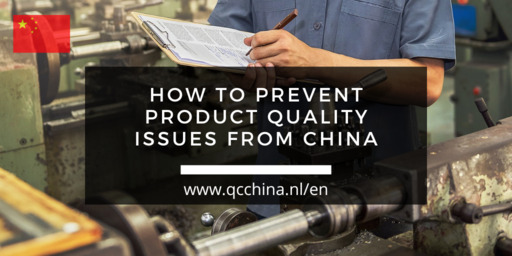
How to prevent product quality issues from China

How to prevent product quality issues from China
China presents many advantages as a manufacturing destination, but it also presents a number of challenges for Western companies, particularly in ensuring product quality.
There are various ways to prevent quality problems from China. It is crucial for importers to carefully select their suppliers. They should choose trustworthy suppliers known for producing high-quality goods.
How to prevent product quality issues from China
To prevent product quality issues from China, it is essential to ensure that reliable suppliers are properly informed before the production process begins. Clear and specific instructions regarding the use of raw materials, materials, and packaging are crucial to avoid any misunderstandings.
Furthermore, it is advisable for Western importers to conduct quality checks at various stages of the production process. This may include inspections such as Factory Audits, First Article Inspections (FAI), and Container Loading Checks (CLC).
These measures enable early detection of any quality problems, thereby preventing serious product quality issues from arising in China.
Factors contributing to quality control problems in China
Quality control issues in China can be attributed to various factors. One major factor is the tendency of Chinese manufacturers to prioritize cost-cutting measures. This practice often results in products that fail to meet customer requirements and international regulations.
Another significant factor is the language barrier that exists between Chinese manufacturers and their international partners. Poor English proficiency can hinder effective communication, making it difficult to convey quality standards and assess whether they are being met.
Additionally, China’s legal system differs from that of other countries, which can create challenges in enforcing quality standards and holding manufacturers accountable for their products’ quality.
To address these issues, it is crucial to implement strict monitoring of Chinese suppliers’ production processes. One approach is to enlist the services of a third-party quality control company like Quality Control to conduct quality inspections, ensuring importers receive the desired level of product quality from China.
Chinese manufacturers are often under pressure to comply with low purchase prices
Chinese manufacturers face intense pressure to lower their prices in order to stay competitive in the global market. However, this pressure not only impacts the manufacturers, but also the workers in China.
To cut costs, manufacturers may be forced to provide low wages, hazardous working conditions, and minimal benefits to their employees. Unfortunately, this emphasis on cost-cutting often comes at the expense of product quality, resulting in unsafe products that may fail to meet safety standards or perform as expected.
Lack of quality control can lead to safety issues
Poor quality control practices in any industry can have severe ramifications. Failure to regulate products or the utilization of materials can create perilous circumstances for consumers and workers in Chinese factories.
While in some instances, inadequate quality control can simply mean that a product is non-compliant and does not perform as expected, it usually does not pose a safety risk.
However, there are other situations where poor quality control can have far-reaching consequences. For instance, if a company fails to adequately test its products, there is a possibility that these products will malfunction in ways that can be harmful to users.
This can be attributed to a variety of factors, including design defects, manufacturing defects, or the use of substandard materials. It is evident that a lack of quality control can result in catastrophic outcomes.
More info?
For Western companies and importers it is important to carry out quality control at the manufacturer. Regular inspections ensure that problems with the product quality from China can be prevented. If you are interested in learning more about the importance of quality checks, please do not hesitate to contact us.

Quality Control offers inspections in the Philippines

‘s-Hertogenbosch, 6 January 2023 – Quality Control has recently started offering its services of professional quality inspections to Western companies and importers who have Filipino suppliers.
By doing so, the Bossche company can enhance its current position in the international trading industry. Furthermore, Western importers can now have more control of the quality of goods that are imported from the Philippines to Europe.
This recent expansion to the Philippines is not totally unexpected, as the Philippine economy has been recovering significantly since the end of the coronavirus crisis. On top of that, the country is strategically located and has an advantageous taxation system.
Quality control plays an increasingly important role in the success of companies that import products outside Europe. This is done to ensure that suppliers are producing quality products and can deliver them on time.
Do you want more information?
Do you have questions about quality control and inspections in the Philippines? Then contact us!

Quality Control services available in the Netherlands & EU

Quality Control services available in the Netherlands & EU
‘s-Hertogenbosch, 21 March 2022 – Quality Control China (QC) now also makes its services available in the Netherlands and the rest of Europe. Thanks to the recent expansion, companies with suppliers located within the EU can rely on quality Quality Control
This will enable the Bossche company to further expand its current market position. Quality Control inspectors control the production lines of Western companies in countries such as China, Vietnam, Pakistan, Bangladesh and Turkey.
The positive development within the company is a reflection of the increasing demand for professional quality control within Europe. Clients vary from start-ups to companies that, for example, have been importing products outside Europe for some time.
Quality Control has been working together with companies, retailers and independent importers all over the world for over 20 years. The high quality inspections enable Western companies to better manage, control and optimize their production line.
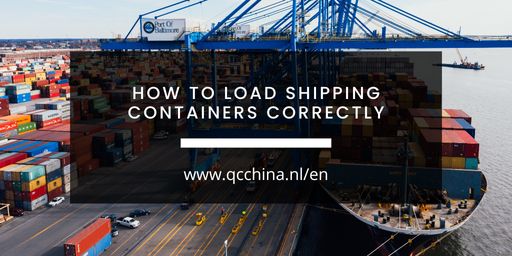
How To Load Shipping Containers Correctly
How To Load Shipping Containers Correctly
As a businessperson, you want to be assured that goods arrive at their destination without damage. In this article you find out how to load shipping containers correctly. Foremost, It is always wise to consider any customs checks. Customs will usually check a container if, for example, it shows an incorrect and/or unprofessional load on the X-ray.
For quality inspectors, this is usually a clear sign that there are unusual objects, or hidden spaces in the container. In most cases, this indication causes an extensive check of the container, which in turn leads to all kinds of extra costs and delays.
The most important factors that play a role when loading a shipping container correctly are:
1. Distribution of weight
2. Use of space
3. Compatibility & availability
4. Laws and regulations
Distribution of weight
A proportional distribution of weight ensures that the shipping container remains in balance during transport. The load is distributed evenly over the entire surface of the bottom.
In addition, heavy products should never be placed above lightweight products. Otherwise, the lightweight products run the risk of being crushed. For example, high-density products should never be loaded next to low-density products, as
this also entails the risk of crushing or damaging the cargo. If the total weight has become too heavy in a certain place, this is compensated with softer material (such as bed linen).
Use of space
When loading a sea container correctly, the available space in the container is used as efficiently as possible. This means that goods are loaded from wall to wall and any empty spaces can be filled with dunnage material.
Do leave the doors of the container completely free, so that no pressure can arise from the inside. Furthermore, lashing straps can be used to secure the load completely. This way products stay in the right place and are less likely to be damaged.
Make sure that the cargo is loaded evenly over the entire surface of the bottom and prevent it from being piled up from the back. The maximum loading capacity of the sea container may not be exceeded.
Compatibility & availability
It is important that the compatibility and availability of a shipping container both are checked well in advance. Therefore, always make a clear schedule before the products roll out of the factory and can be loaded into the container. This prevents all compatible containers from being rented out or not being available.
The safe transport of goods is always in proportion to the compatibility of the container. It is essential for large, heavy and dangerous loads to be carefully checked beforehand. Think about; volume, weight, size and density of products.
These characteristics largely determine the compatibility of a container. This also applies to other product features such as; solid, liquid, color and even the smell of a cargo can play a role when loading a shipping container correctly.
Laws and regulations
Nowadays, there are strict laws and regulations for importing products, both within and outside the EU. Especially when loading shipping containers with dangerous loads, it can be wise to call in the help of an external party such as Quality Control China.
Our highly trained inspectors will supervise your products as they are loaded into the shipping container. Several checks such as a Container Loading Check are made to ensure that your products are loaded carefully and correctly.
The compatibility of the container itself is also extensively checked by our inspectors. If everything is approved, the inspector will personally seal the container. If you have any questions about how to load shipping containers correctly? Please feel free contact us!








